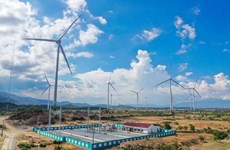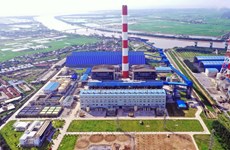Ministry of Finance greenlights latest fuel price hike
The Ministry of Finance on December 18 allowed petrol distributors to
increase prices of petrol by a maximum of 584 VND (2.78 cent USD) to
24,214 VND (1.15 USD) per litre.
The Ministry of Finance on December 18 allowed petrol distributors to
increase prices of petrol by a maximum of 584 VND (2.78 cent USD) to
24,214 VND (1.15 USD) per litre.
Meanwhile, the price of diesel fuel was raised by 653 VND per litre to 22,963 VND, and kerosene by 384 VND to 22,404 VND per litre.
The Vietnam National Petroleum Group, which holds more than 50 percent of the market share, reported its price hike of petrol Ron 92, which has been raised to 24,210 VND per litre.
The ministry also asked businesses to stop drawing out from the nation's price stabilisation fund for petrol and diesel. Before the rise, which took effect from 2 pm, businesses were allowed to dip into the fund to offset losses of 200-300 VND per litre of petrol and diesel, respectively.
As for kerosene, businesses will continue using the fund at 700 VND (33 cent) per litre because sales are low and businesses have been selling kerosene at a loss, with a selling price lower than the base price.
By December 10, the nation's price stabilisation fund for petrol and diesel had 72 billion VND (3.42 million USD).
This is the fifth hike for petrol and kerosene since early this year. There were also six price reductions during 2013.
The new price for petrol is still lower than the record price of more than 25,000 VND per litre set in March this year.
Since November, the ministry had repeatedly emphasised that the petrol businesses had been suffering losses due to the world's price fluctuations.
It is estimated that 70 per cent of the petrol in the local market was imported, so retail prices depended heavily on global fluctuations.
7 percent limit
Petroleum traders can raise retail prices if price increases are not higher than 7 percent, compared to previous prices, according to the amended Decree N°84/2009/ND-CP on trading petrol.
Under the Ministry of Industry and Trade's draft, which is publicised on its website for recommendations, if wholesale prices increase by 7-12 percent, traders are required to submit their price hike plans to the ministries of Finance, and Industry and Trade, for approval two days before raising prices.
In case wholesale prices increase by more than 12 percent, the Prime Minister will decide on measures to stabilise the petroleum market.
If wholesale prices decline less than 12 percent, traders will have to cut retail prices. If the decline is more than 12 percent, the traders will have to continuously cut their retail price after the Government increases import taxes and raises money that the traders have to contribute to the Price Stabilisation Fund.
Under the draft, the time between each price hike will be 15 days, instead of the current 30 days. The price would be determined after considering worldwide and regional prices during 15 consecutive days.-VNA
Meanwhile, the price of diesel fuel was raised by 653 VND per litre to 22,963 VND, and kerosene by 384 VND to 22,404 VND per litre.
The Vietnam National Petroleum Group, which holds more than 50 percent of the market share, reported its price hike of petrol Ron 92, which has been raised to 24,210 VND per litre.
The ministry also asked businesses to stop drawing out from the nation's price stabilisation fund for petrol and diesel. Before the rise, which took effect from 2 pm, businesses were allowed to dip into the fund to offset losses of 200-300 VND per litre of petrol and diesel, respectively.
As for kerosene, businesses will continue using the fund at 700 VND (33 cent) per litre because sales are low and businesses have been selling kerosene at a loss, with a selling price lower than the base price.
By December 10, the nation's price stabilisation fund for petrol and diesel had 72 billion VND (3.42 million USD).
This is the fifth hike for petrol and kerosene since early this year. There were also six price reductions during 2013.
The new price for petrol is still lower than the record price of more than 25,000 VND per litre set in March this year.
Since November, the ministry had repeatedly emphasised that the petrol businesses had been suffering losses due to the world's price fluctuations.
It is estimated that 70 per cent of the petrol in the local market was imported, so retail prices depended heavily on global fluctuations.
7 percent limit
Petroleum traders can raise retail prices if price increases are not higher than 7 percent, compared to previous prices, according to the amended Decree N°84/2009/ND-CP on trading petrol.
Under the Ministry of Industry and Trade's draft, which is publicised on its website for recommendations, if wholesale prices increase by 7-12 percent, traders are required to submit their price hike plans to the ministries of Finance, and Industry and Trade, for approval two days before raising prices.
In case wholesale prices increase by more than 12 percent, the Prime Minister will decide on measures to stabilise the petroleum market.
If wholesale prices decline less than 12 percent, traders will have to cut retail prices. If the decline is more than 12 percent, the traders will have to continuously cut their retail price after the Government increases import taxes and raises money that the traders have to contribute to the Price Stabilisation Fund.
Under the draft, the time between each price hike will be 15 days, instead of the current 30 days. The price would be determined after considering worldwide and regional prices during 15 consecutive days.-VNA













